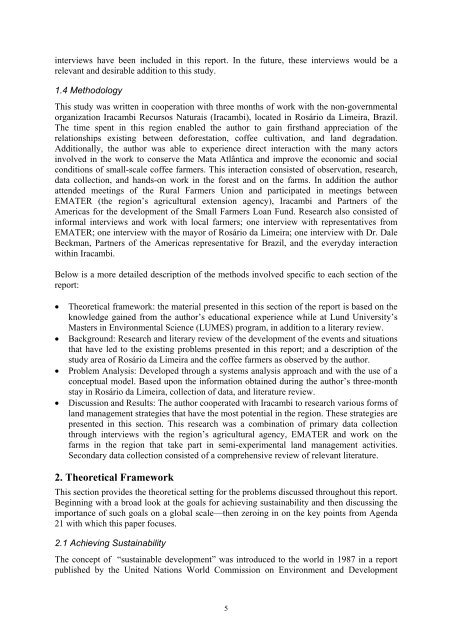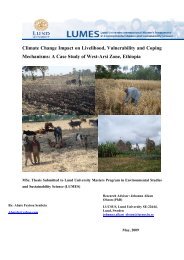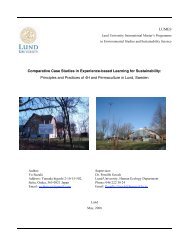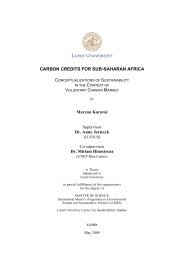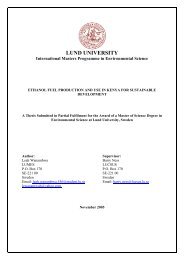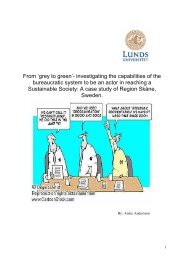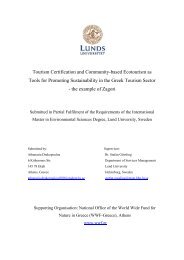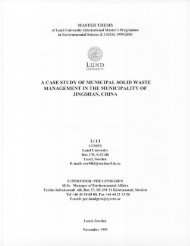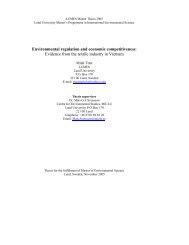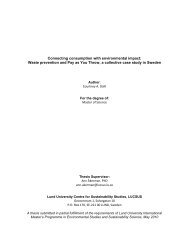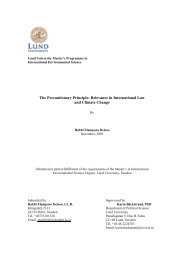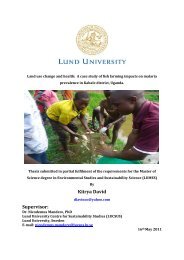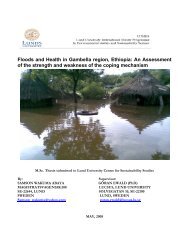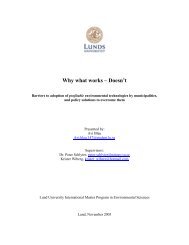Deforestation, Coffee Cultivation, and Land Degradation ... - lumes
Deforestation, Coffee Cultivation, and Land Degradation ... - lumes
Deforestation, Coffee Cultivation, and Land Degradation ... - lumes
Create successful ePaper yourself
Turn your PDF publications into a flip-book with our unique Google optimized e-Paper software.
interviews have been included in this report. In the future, these interviews would be arelevant <strong>and</strong> desirable addition to this study.1.4 MethodologyThis study was written in cooperation with three months of work with the non-governmentalorganization Iracambi Recursos Naturais (Iracambi), located in Rosário da Limeira, Brazil.The time spent in this region enabled the author to gain firsth<strong>and</strong> appreciation of therelationships existing between deforestation, coffee cultivation, <strong>and</strong> l<strong>and</strong> degradation.Additionally, the author was able to experience direct interaction with the many actorsinvolved in the work to conserve the Mata Atlântica <strong>and</strong> improve the economic <strong>and</strong> socialconditions of small-scale coffee farmers. This interaction consisted of observation, research,data collection, <strong>and</strong> h<strong>and</strong>s-on work in the forest <strong>and</strong> on the farms. In addition the authorattended meetings of the Rural Farmers Union <strong>and</strong> participated in meetings betweenEMATER (the region’s agricultural extension agency), Iracambi <strong>and</strong> Partners of theAmericas for the development of the Small Farmers Loan Fund. Research also consisted ofinformal interviews <strong>and</strong> work with local farmers; one interview with representatives fromEMATER; one interview with the mayor of Rosário da Limeira; one interview with Dr. DaleBeckman, Partners of the Americas representative for Brazil, <strong>and</strong> the everyday interactionwithin Iracambi.Below is a more detailed description of the methods involved specific to each section of thereport:• Theoretical framework: the material presented in this section of the report is based on theknowledge gained from the author’s educational experience while at Lund University’sMasters in Environmental Science (LUMES) program, in addition to a literary review.• Background: Research <strong>and</strong> literary review of the development of the events <strong>and</strong> situationsthat have led to the existing problems presented in this report; <strong>and</strong> a description of thestudy area of Rosário da Limeira <strong>and</strong> the coffee farmers as observed by the author.• Problem Analysis: Developed through a systems analysis approach <strong>and</strong> with the use of aconceptual model. Based upon the information obtained during the author’s three-monthstay in Rosário da Limeira, collection of data, <strong>and</strong> literature review.• Discussion <strong>and</strong> Results: The author cooperated with Iracambi to research various forms ofl<strong>and</strong> management strategies that have the most potential in the region. These strategies arepresented in this section. This research was a combination of primary data collectionthrough interviews with the region’s agricultural agency, EMATER <strong>and</strong> work on thefarms in the region that take part in semi-experimental l<strong>and</strong> management activities.Secondary data collection consisted of a comprehensive review of relevant literature.2. Theoretical FrameworkThis section provides the theoretical setting for the problems discussed throughout this report.Beginning with a broad look at the goals for achieving sustainability <strong>and</strong> then discussing theimportance of such goals on a global scale—then zeroing in on the key points from Agenda21 with which this paper focuses.2.1 Achieving SustainabilityThe concept of “sustainable development” was introduced to the world in 1987 in a reportpublished by the United Nations World Commission on Environment <strong>and</strong> Development5


